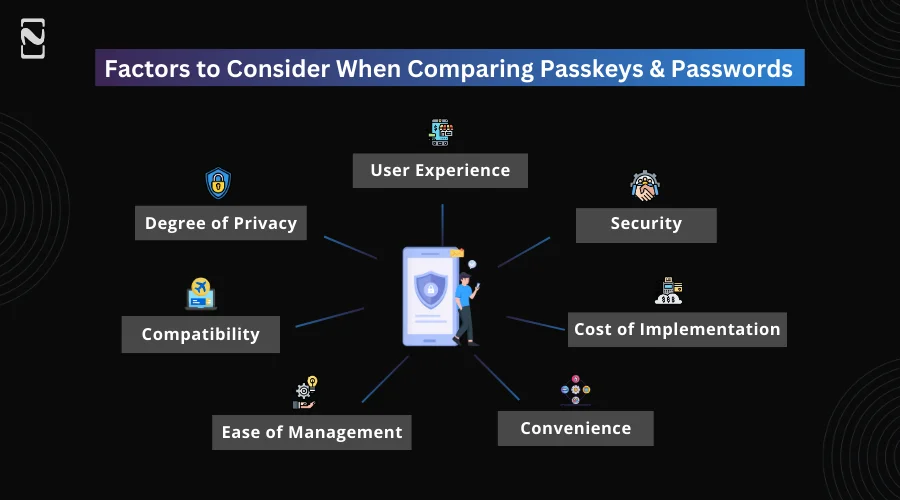Passwords and passkeys are both integrated deeply into the daily routine of anyone who uses any sort of digital device (or isn’t living under a rock).
From unlocking your mobile phone to unlocking smart homes, passwords and passkeys are used for everything, which is why it is important to choose the right option.
You see, the dilemma with passwords is that you need to remember them, so you might prefer it to be something easy.
However, at the same time, you are using a password to keep things safe, which means you need a strong password.
However, that dilemma has certainly been resolved with the emergence of Passkeys.
Now, many of you might be confused, as people often tend to use passwords and passkeys interchangeably.
If you are unaware of the differences between passkeys and passwords, then this is the post for you.
In this one, let’s compare them both and put the debate of passkey vs password to an end, once and for all.
Without further ado, let’s start by learning about each of them.
An Overview of Passwords
A password is a string of characters that a user is required to choose when creating credentials for any digital account.
It is a crucial part of your login credentials, along with the username or your contact information.

You need to set a password containing both capital and lowercase letters, along with numbers and symbols, as per your choice.
Keep in mind that it is a part of your credentials, used to authenticate your identity to the platform/device.
It also means that since you have created the password, it is your responsibility to remember it.
For decades now, people have been using passwords as their go-to authentication method. A password can be both complex and simple, depending on what you prefer.
You can either create a complex password and save it for later use, or you can create a simple password.
Both ways, your authorization is highly vulnerable if you have saved the password to your device; anyone with access to your device can access your account.
If the password is simple, it is easy to guess and hence can be easily broken.
Pros & Cons of Using a Password
When opting for a password, you get the benefit of security and have an authentication protocol in place for your digital account.
However, there are several disadvantages as well that you might face.
Check them out.
Pros of Using a Password
- Passwords work as a barrier for unauthorized users and protect your digital accounts.
- When you have set a strong password, it becomes tough for a cyber attacker to access your personal information.
- Passwords are easy to implement and highly flexible, even for a novice user who is not so tech-savvy.
Cons of Using a Password
- Passwords set by users are highly vulnerable to brute force attacks, which is a common method used by attackers and hackers.
- It often becomes difficult for a user to remember passwords, which in turn results in inconvenience when logging into a new device.
- Users often use the same string of characters for different accounts, which means if one account is compromised, all of them are!
All in all, one can say that passwords are a way to keep the digital account secure; however, they only offer a basic barrier with enough vulnerabilities and flaws.
Now that you have an idea of what a password is and the pros and cons that it brings along, it is time to take a look at the passkeys.
What is a Passkey?
Passkey is an upgraded version of the password.
With the availability of modern options to unlock a device or access your digital account through facial recognition and biometric authentication, passkeys offer a more secure and direct way of authorizing access.
It uses cryptographic keys that can be tied to specific devices and accounts. This means you need not remember it, as it is already dedicated to your device/account.
Public key cryptography makes the entire process super secure.
The way it works is quite simple – two keys, public and private, are created for authentication and security.
The public key is directly shared with the service provider, which means it is no longer required to be shared manually.
On the other hand, the private key is stored on your device to ensure that you can easily access it whenever necessary.
What this means is whenever you are using a personal device and want to access your digital account, the solution will generate a cryptographic challenge that can only be resolved by your public key, thanks to device-based authentication.
The entire functionality of a passkey is designed in such a way that it supersedes the existing authentication mechanisms, including your passwords.
Passkeys are considered to be more secure and simplified when compared to passwords, but more on that later.
Pros and Cons of Passkeys
The concept of passkeys sure appears highly secure and technically advanced. However, it also has its own benefits and drawbacks.
While the convenience of passkeys is surely a benefit, the complexity of implementation can often become an issue for the users.
Let’s learn more about the same –
Pros of Using a Passkey
- Passkeys bring along solid phishing resistance as these are dedicated to a certain platform/website/device and cannot be used to work on fake or deceptive websites.
- The convenience is enhanced for users as they no longer have to remember the passwords. The device they use to access the account serves as the mode of authentication.
- Passkeys are also highly distributed as they do not store your password on the server; instead, they keep your public key, which means you are safe even if there’s a data breach.
Cons of Using a Passkey
- The first issue that a user may face when using a passkey is that these are highly device-dependent. This means if a device is lost or stolen, your access to the platform is also gone with it.
- Another limitation of using a passkey is that it is not yet mainstream, which also means that not every app and website currently offers passkey support.
- Setting up a passkey is not as easy as choosing a password of your choice. Which is why it is not highly adapted by the market. Another disadvantage is that storing passkeys is more complicated for a user.
A passkey is something that can be highly beneficial for the right user. Sure, if you are already set into an ecosystem of operating systems/devices, you can easily maintain the passkeys.
However, when migrating from one system to another, you might face compatibility issues.
Passkey Vs Password: A Comprehensive Comparison
After learning about both of them, you might be wondering which one is better. Well, as mentioned above, both passkeys and passwords have their pros and cons.
In order for you to make the correct choice between the two and to clear the confusion that you might have, we have crafted a complete comparison table.
The table shows how passkeys and passwords are similar and different from each other, based on different factors that one must keep in mind.
Before taking a look at the passkey vs password comparison table, let’s take a look at the factors on which we have based our analysis.
Factors to Consider When Comparing Passkeys & Passwords

- User Experience: How complicated or simplified is the interaction for the user when using any of them?
- Security: What degree of security does each of them offer, and how secure is using any of the authentication methods?
- Cost of Implementation: How much does it cost you as a business to implement the authentication tool?
- Convenience: This factor refers to the usability convenience of the user and how easy it is to use either of the services.
- Ease of Management: For any user, how easy it is to store and manage the key/password for their business.
- Compatibility: Not all platforms/applications use the same authentication mechanisms. Hence, it is crucial to know which is more compatible and acceptable.
- Degree of Privacy: How private the information is kept when any of the authentication protocols is used.
Now that you are familiar with the basics of our comparison, let’s take a look at the comparison table that clears the picture in the battle of passkey vs password.
| Factors | Passkey | Password |
| User Experience | Uses a biometric solution and offers a seamless unlocking experience. Stays unique to the device, so no need for updates | Manually entering a password requires regular updates to the password. |
| Security | Uses cryptography, which makes it highly secure. | It is not safe, as anyone can plan a brute force attack and try to access your digital account. |
| Cost of Implementation | For a user, it is free and embedded in the OS. However, from the perspective of the provider, the API integration for the same can make a difference. | Passwords, too, are free to use and are always available. However, the cost associated with the password manager can be hefty for a user. |
| Convenience | Consider more convenience as one does not need to remember it. | Passwords often become less convenient as different apps use different passwords, making it inconvenient to remember them. |
| Ease of Management | Saving a passkey is easy, and since it is generated once, it works fine. Managing a passkey is simpler as it is already stored on the device that you use. | Managing a password can be difficult, which is why you need a password manager; however, that is an additional cost for you. |
| Compatibility | The implementation of passkeys is quite new for platforms, and not all platforms are compatible with the same. | Passwords are widely accepted and are highly compatible. |
| Degree of Privacy | Passkeys do not allow the tracking of activities. It also only saves the user’s public key on the platform rather than placing the password, keeping it safe from a data breach. | Passwords offer access to a service when used as credentials; however, they can often be cracked easily through simple guesses or a cyber attack. |
Passkey Vs Password: Which One is Better?
After the entire comparison, you might have gotten an idea of which one is better for you. The implementation of both authentication mechanisms depends on user preferences.
If we talk about superiority, Passkey can be found superior in terms of technical advancements and security, whereas passwords are better in terms of adoption and compatibility with existing solutions.
In case you are wondering which one to choose for yourself, you should consider using a passkey as it is more convenient and reliable in the long run.
Even the best mobile app development company will suggest that you opt for passkey integration into your application if you plan to build an app.
If you are looking for professionals who can help you secure your app with the best practices, you can easily reach out to the experts at Nimble AppGenie.
With decades of experience, we are highly skilled and up to date with the latest technologies to guide you better.
Not to mention, you can always be at the forefront of your mobile app security with the assistance of our developers.
Conclusion: The Future of Digital Security Looks SAFE!
Looking at the security measures available in the market in the form of passkeys and passwords, it can be said that both options are functioning at their best to keep the applications secure.
While passwords today are the majority security measure that is being used, passkeys are surely here to stay as they offer better convenience and security at the same time.
If you are also looking for ways to integrate better security measures into your apps, or want to understand which one is better, we hope this blog has answered all your queries.
Thanks for reading, good luck.
FAQs
There are 5 steps involved in the implementation of passkeys:
- Registration
- Authentication
- Passkey Retrieval
- Passkey Processing
- Authentication Successful

Niketan Sharma, CTO, Nimble AppGenie, is a tech enthusiast with more than a decade of experience in delivering high-value solutions that allow a brand to penetrate the market easily. With a strong hold on mobile app development, he is actively working to help businesses identify the potential of digital transformation by sharing insightful statistics, guides & blogs.
Table of Contents




No Comments
Comments are closed.